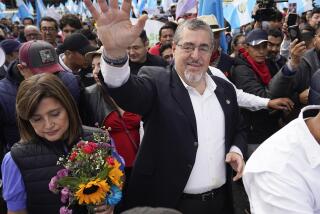Regime Calls for New Voting in Cambodia
- Share via
PHNOM PENH, Cambodia — With its victory increasingly in doubt, the Phnom Penh government Tuesday called on the United Nations to hold fresh elections in four provinces where it said there were irregularities during voting last week and warned that if its demand is not met, it will reject the results of the elections.
Khieu Kanarith, a government spokesman, added to a feeling of nervousness here by saying that the government has received “many indications that there may be some insurrection or riots. We feel the situation may get out of control.”
The Vietnamese-installed regime appeared to be moving quickly to provide justification for a renunciation of the national elections, which were conducted by the United Nations at a cost of $2.6 billion over 15 months and involved more than 22,000 troops and civilians.
The government demand was announced as votes were still being counted, but the trend appeared to show that the Phnom Penh government would at best share power with the opposition royalist party, known as FUNCINPEC, and could ultimately be a minority partner in the government.
Its demand also raises the question of what action the United Nations might take to force the regime to accept the results of the voting, which took place over six days last week. The government controls 80% of the country, an army of 40,000 people and virtually every civil servant from the Finance Ministry down to the headman in each village.
The elections for the 120-seat Constituent Assembly that will write a new constitution for Cambodia and then form the next government were arranged in an October, 1991, peace agreement signed by the government and three guerrilla groups fighting it from havens in Thailand.
The present Phnom Penh government was put into power by Vietnam in 1979 when the Vietnamese army invaded the country and expelled the Maoist Khmer Rouge from power.
About 90% of the nation’s 4.6 million registered voters took part in the elections despite a boycott and threats of violence by the Khmer Rouge.
The government’s apparent rejection of the results Tuesday brings to mind the situation in Myanmar, formerly Burma, where the ruling military junta refused to hand over power in May, 1990, when it was beaten in an election landslide by a coalition of democratic groups. The results of elections arranged by the United Nations in the African nation of Angola were similarly rejected last year by the UNITA rebel movement, which lost to the former Marxist government.
Chea Sim, the hard-line leader of the Cambodian People’s Party, the government’s political party, met Monday night with Yasushi Akashi, head of the U.N. Transitional Authority in Cambodia (UNTAC), to present his government’s demands.
At a press conference Tuesday, Sok An, the party’s spokesman, said the People’s Party is pressing for fresh elections in the provinces of Phnom Penh, Battambang, Kompong Chhnang and Prey Veng, although he left open the possibility that other provinces might be included.
FUNCINPEC is leading in Phnom Penh and Battambang, two of the largest provinces in the country, while trailing the government in Kompong Chhnang and Prey Veng, two of the smaller provinces.
“We demand a reelection,” Sok An said. “If a reelection cannot be done, we cannot recognize the result.”
A U.N. spokesman said Akashi told government officials that the United Nations will need evidence of the irregularities. “In the absence of it, they had no plans to proceed to a new poll in these provinces,” the spokesman said.
Akashi has already certified the election process as free and fair, a decision backed up by the United States, the European Community and China.
He said there are “all kinds of repercussions” from the government’s move but that he does not believe that new elections are necessary.
Asked why he thinks the government has taken the step of calling for new voting, Akashi said, “I think there are some internal difficulties to convince these people to accept the elections. It may not be easy.”
U.N. officials said the Phnom Penh regime was deeply wounded by its showing in central Kompong Cham province, where partial returns show the party being beaten 2 to 1 by FUNCINPEC. Kompong Cham has 18 seats in the Parliament, the most of any province, and is the home of Prime Minister Hun Sen, who campaigned there extensively.
One Western diplomat noted that while the government’s showing was quite respectable, it has ruled Cambodia for 13 years as a one-party state and was completely unprepared to share power except in a token fashion. He said the problem lies in the provinces where local officials now serving the Phnom Penh government had lost their bids for seats and would hesitate to hand over power.
Sok An repeated his contention that the irregularities consisted of the United Nations’ refusal to allow party agents into “safe havens” where ballot boxes were stored; broken seals on some ballot boxes; questions about the ink designed to prevent voter fraud, and the bias of local UNTAC employees at polling stations.
The United Nations has maintained that seals on some of the ballot boxes were broken off accidentally during transportation of the boxes.
But in any case, the accusations of irregularities applied to the voting rather than the vote count.
More to Read
Sign up for Essential California
The most important California stories and recommendations in your inbox every morning.
You may occasionally receive promotional content from the Los Angeles Times.













